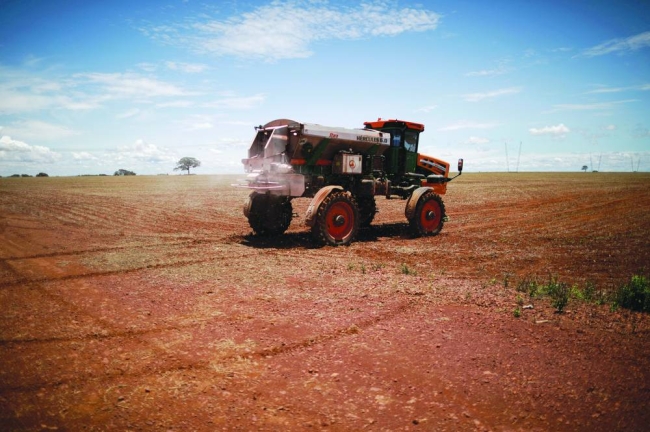
An agricultural worker drives a tractor spreading fertiliser in a soybean field, near Brasilia. (Reuters)
Latin American farmers are in for a rough ride if the US slaps secondary sanctions on buyers of Russian exports, such as the fertilisers essential for cash crops from Mexican avocados to Brazilian soybeans and corn.
For farm powerhouse Brazil, which covered about a third of its fertiliser demand with $3.7bn of imports from Russia last year, there is virtually no alternative to fill the gap if those flows are halted, experts and industry players said.
The 2022 outbreak of war in Ukraine triggered stockpiling of Russian fertiliser in the region. Prices soared briefly, but trade has now normalised. Plans to boost domestic fertiliser production in Mexico and Brazil have made slow progress in the face of relatively cheap Russian imports.
Shipments to Brazil, the world’s largest producer of soybeans, sugar and coffee, rose nearly 30% in the first half of this year, the Russian Fertiliser Producers Association said.
Nato Secretary General Mark Rutte singled out Brazil among a handful of countries that could be hit “very hard” by sanctions for doing business with Russia as part of US President Donald Trump’s renewed push to end the war in Ukraine.
Fresh sanctions targeting Russian fertiliser imports could “render soybean and corn production inviable,” said Lucas Beber, vice-president of Brazilian grain farming group Aprosoja.
Mexico also imported more than $580mn of fertilisers last year from Russia, its largest supplier according to government data. Potential US sanctions would pose a big problem for farmers there.
“It would affect Mexico’s purchases from Russia of different fertilisers, particularly urea, which is the most widely used in crops such as corn, sorghum, wheat, and even avocado,” said Raul Urteaga. A former director of international affairs for Mexico’s agriculture ministry, Urteaga warned of a drop-off in the quality of fertilisers available if Russian imports disappear.
That could weaken avocado production and send prices higher for US consumers. The US accounts for more than 80% of Mexico’s total avocado exports, a market worth more than $3bn last year, according to US government data.
“The price of avocados would increase if producers have to use other alternatives or find fertilisers that are imported from sources other than Russia,” Urteaga said.
Russia is also top fertiliser supplier for Colombia, another key producer of fruits, flowers and coffee to the US. Russia provides about a quarter of Colombia’s fertiliser imports, government data shows.
The World Bank has identified fertiliser costs as a driver of food inflation in Central America, contributing to a cost-of-living crisis that has stoked northward migration.
Sales delayedEven fertiliser companies that have already cut ties with Russian suppliers, like US-based Mosaic, expressed fears that further trade disruptions with one of the world’s top three fertiliser producers could feed volatility.
“Potential discussions involving retaliation against countries that operate with Russia … only end up further aggravating the situation in terms of pricing,” said Eduardo Monteiro, Mosaic’s country manager in Brazil, which contributes 40% of the company’s global revenue.
He said geopolitical tensions delayed sales to Brazilian farmers for the next crop cycle, which could compromise timely fertiliser deliveries for major crops such as soybeans, which farmers plant from September.
Big privately held fertiliser makers Eurochem and Fertipar, which supply their Brazilian processing plants with imports from Russia according to trade data, declined or did not reply to questions about potential sanctions.
Brazil has touted plans to nearly halve its reliance on foreign fertilisers. Mexico aims to boost domestic production from 33% to 80% of local demand. Brazilian President Luiz Inacio Lula da Silva and Mexico’s Claudia Sheinbaum have both prodded state oil companies Petrobras and Pemex to ramp up fertiliser production.
They have made slow progress, however. In Brazil’s case, efforts were hampered by factors including lack of funding, potentially costly mineral resources and expensive natural gas, which is key to producing nitrogen fertilisers.
The problem could be partly mitigated after Brazil Potash Corp starts to mine for potash in the Brazilian Amazon, which should happen once the infrastructure and permitting are in place.
In Mexico, debt-laden Pemex has struggled over the years to make fertilisers a profitable business.
Unfazed by local competition, US sanctions or European bans, Russian fertiliser producers say they expect to raise their global market share to 25% by 2030, relying largely on sales to developing Brics nations including Brazil, India and China. — Reuters





